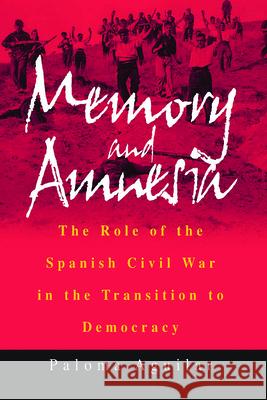Memory and Amnesia » książka
Memory and Amnesia
ISBN-13: 9781571814968 / Angielski / Miękka / 2002 / 356 str.
..". this excellent history of the Spanish desire for reconciliation is a major contribution to the study of both the Transition and memory." - Journal of Modern History "This book ... is one of the most important research studies written recently about the Spanish transition to democracy ... It] will be of treat use for historians, researchers of cultural studies (Aguilar used cinema and art sources), political scientists and policy makers engaged in the transition process from non-democratic regimes." - Democratization "This methodologically exemplary study makes an essential contribution to research on historical memory in Spain, the most important issue within the country's contemporary history." - Stanley Payne, University of Wisconsin-Madison "Paloma Aguilar has made an important, meticulous and impartial contribution to a crucial aspect of our contemporary memory." - Victor Perez-Diaz, Complutense University of Madrid "Paloma Aguilar's detailed and composed study of the historical memory of the Spanish Civil War is a work of considerable importance. In addition to its scientific interest, it offers an exciting read." - Paul Preston, London School of Economics ..". a very convincing analysis." - Historische Zeitschrift "The translation into English of a book written by a contemporary Spanish historian is an unusual publishing event. This] work.is richly deserving of this tribute.this excellent history of the Spanish desire for reconciliation is a major contribution to the study of both the Transition and memory." - Modern History Using a rich variety of sources such as official newsreels, school textbooks, the work of contemporary historians, memoirs, official documents, legislation, and monuments, this book explores how the historical memory of the Spanish Civil War (1936-1939) influenced the transition to democracy in Spain after Franco's death in 1975. The author traces the development of official discourse on the War throughout the Franco period and describes the regime's attempts to achieve political legitimacy. Although there was no universal consensus regarding the events of the Civil War, general agreement did exist concerning the main lesson which should be drawn from it: never again should Spaniards become embroiled in a fratricidal conflict. Paloma Aguilar is Professor of Political Science at the Universidad Nacional de Educacion a Distancia (Madrid, Spain) and Doctor Member of the Juan March Institute (Madrid, Spain).
"... this excellent history of the Spanish desire for reconciliation is a major contribution to the study of both the Transition and memory." · Journal of Modern History"This book ... is one of the most important research studies written recently about the Spanish transition to democracy ... [It] will be of treat use for historians, researchers of cultural studies (Aguilar used cinema and art sources), political scientists and policy makers engaged in the transition process from non-democratic regimes." · Democratization"This methodologically exemplary study makes an essential contribution to research on historical memory in Spain, the most important issue within the countrys contemporary history." · Stanley Payne, University of Wisconsin-Madison"Paloma Aguilar has made an important, meticulous and impartial contribution to a crucial aspect of our contemporary memory." · Víctor Pérez-Díaz, Complutense University of Madrid"Paloma Aguilars detailed and composed study of the historical memory of the Spanish Civil War is a work of considerable importance. In addition to its scientific interest, it offers an exciting read." · Paul Preston, London School of Economics"... a very convincing analysis." · Historische Zeitschrift"The translation into English of a book written by a contemporary Spanish historian is an unusual publishing event. [This] work.is richly deserving of this tribute.this excellent history of the Spanish desire for reconciliation is a major contribution to the study of both the Transition and memory." · Modern HistoryUsing a rich variety of sources such as official newsreels, school textbooks, the work of contemporary historians, memoirs, official documents, legislation, and monuments, this book explores how the historical memory of the Spanish Civil War (1936-1939) influenced the transition to democracy in Spain after Francos death in 1975. The author traces the development of official discourse on the War throughout the Franco period and describes the régimes attempts to achieve political legitimacy. Although there was no universal consensus regarding the events of the Civil War, general agreement did exist concerning the main lesson which should be drawn from it: never again should Spaniards become embroiled in a fratricidal conflict.Paloma Aguilar is Professor of Political Science at the Universidad Nacional de Educación a Distancia (Madrid, Spain) and Doctor Member of the Juan March Institute (Madrid, Spain).











